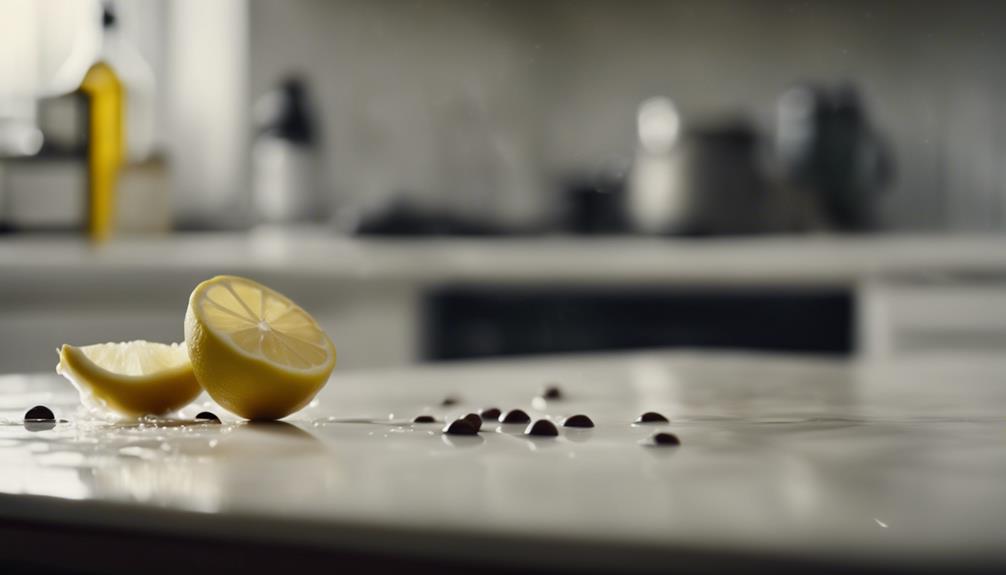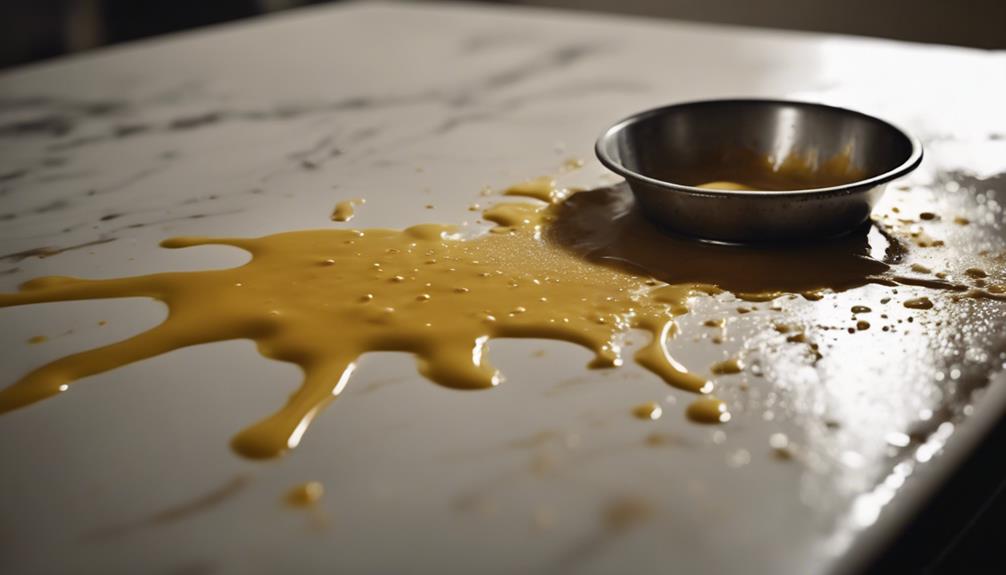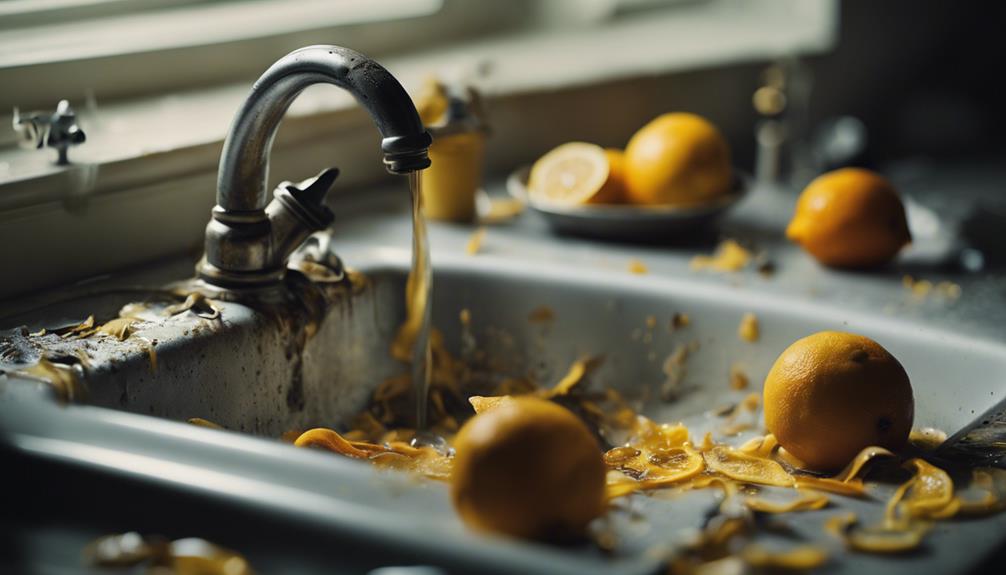Revamp your kitchen cleaning routine with eco-friendly stain removal tips. Use lemon juice for grease stains, white vinegar for odor, and citrus peel for degreasing. Try baking soda for burnt spills and salt for stubborn stains. Cornstarch tackles oil stains, while olive oil is great for wood surfaces. Add club soda for fresh spills and tea tree oil for antibacterial cleaning. These tips will keep your kitchen sparkling clean and chemical-free.
Key Takeaways
- Use baking soda for burnt spills and salt for stubborn stains.
- Try cornstarch on oil stains for effective removal.
- Utilize lemon juice to tackle grease stains naturally.
- Use white vinegar to eliminate odors in the kitchen.
- Consider club soda for effective removal of various stains without harsh chemicals.
Lemon Juice for Grease Stains
If you're looking to tackle grease stains in your kitchen using a natural and eco-friendly solution, consider harnessing the power of lemon juice. Lemon juice is a fantastic natural cleaner that can effectively break down grease stains on various kitchen surfaces. The acidic nature of lemon juice makes it a potent degreaser, perfect for cutting through tough grease and grime without the need for harsh chemicals. You can use lemon juice to clean greasy stovetops, countertops, and kitchen appliances, leaving them sparkling clean and smelling fresh.
To create a powerful grease-fighting solution, mix lemon juice with water and apply it to stubborn grease stains in your kitchen. Not only does lemon juice help in removing grease stains, but it also leaves a pleasant citrus scent behind, enhancing the overall ambiance of your kitchen. By opting for lemon juice as a natural and eco-friendly cleaner, you can maintain a clean and healthy kitchen environment without compromising on effectiveness.
Baking Soda for Burnt Spills
For removing burnt spills in your kitchen, consider utilizing the natural abrasive power of baking soda. Baking soda is an effective and eco-friendly solution for tackling tough burnt spots on various kitchen surfaces. Its abrasive nature makes it ideal for scrubbing away burnt spills from countertops, sinks, and ovens without the need for harsh chemicals. By creating a paste with water, you can easily target and lift stubborn burnt food residues, restoring the cleanliness of your kitchen surfaces.
In addition to its cleaning properties, baking soda is a versatile multi-purpose product that can be used for various cleaning tasks in the kitchen. Convenient pre-mixed baking soda options are also available, making it even easier to incorporate this eco-friendly cleaning solution into your routine. Whether you're dealing with burnt spills or looking for a natural way to freshen up your kitchen, baking soda is a reliable and environmentally friendly choice.
White Vinegar for Odor Removal

To effectively combat kitchen odors, consider incorporating white vinegar, a natural and eco-friendly solution known for its odor-neutralizing properties. White vinegar is a sustainable alternative to commercial air fresheners, as it effectively neutralizes and eliminates unpleasant smells without harsh chemicals. Its acidic properties help break down odor-causing compounds on kitchen surfaces such as countertops, appliances, and sinks, leaving your kitchen fresh and clean.
Using white vinegar for odor removal isn't only cost-effective but also environmentally friendly. By harnessing the power of this eco-friendly ingredient, you can create a healthier indoor environment without exposing yourself to harmful synthetic fragrances. Simply mix white vinegar with water in a spray bottle and apply it to the affected areas. Allow it to sit for a few minutes before wiping it off with a damp cloth. Embrace the natural benefits of white vinegar for a fresher kitchen without compromising on sustainability.
Salt for Stubborn Stains
Salt serves as an effective natural abrasive for tackling stubborn stains in your kitchen. When dealing with tough grease, grime, or food residue on kitchen surfaces, salt can be your eco-friendly and cost-effective solution.
Simply sprinkle salt over the stubborn stain and gently scrub the area to help break down the residue. The abrasive nature of salt aids in lifting the stain off the surface without causing damage, making it safe to use on most kitchen surfaces.
This method not only helps in removing the stains effectively but also contributes to maintaining a clean and chemical-free kitchen environment. By utilizing salt for stubborn stains, you're opting for an environmentally friendly cleaning approach that's readily available in most households.
Embrace the power of salt as a natural cleaner and witness its ability to restore your kitchen surfaces to their pristine condition.
Cornstarch for Oil Stains

When tackling oil stains in your kitchen, consider using cornstarch as a natural and eco-friendly solution to effectively absorb and lift the stains.
Cornstarch is a fantastic option for dealing with oil stains on various kitchen surfaces. Simply sprinkle cornstarch over the oil-stained area and allow it to sit for a few hours. During this time, the cornstarch will work its magic by absorbing the oil from the surface. After waiting, gently brush or wipe away the cornstarch, and you'll notice a significant reduction in the oil stain.
This method not only helps in stain removal but also contributes to maintaining a clean kitchen environment. Cornstarch serves as a natural and eco-friendly alternative to chemical-based stain removers, making it a sustainable choice for keeping your kitchen surfaces spotless.
Embrace this cost-effective and environmentally friendly approach to dealing with oil stains in your kitchen.
Hydrogen Peroxide for Disinfecting
When cleaning your kitchen, consider using hydrogen peroxide for disinfecting surfaces effectively. Its ability to kill bacteria and viruses makes it a powerful sanitizing agent.
You can benefit from a clean and eco-friendly kitchen environment by incorporating hydrogen peroxide into your cleaning routine.
Peroxide for Sanitizing
To effectively sanitize your kitchen surfaces and utensils, consider utilizing the powerful disinfectant properties of hydrogen peroxide. Hydrogen peroxide is a versatile eco-friendly disinfectant that can kill bacteria, viruses, and mold effectively.
By diluting hydrogen peroxide with water, you can create a safe and efficient sanitizing solution without the use of harmful chemicals. This approach provides a greener cleaning alternative compared to traditional disinfectants.
Using hydrogen peroxide for sanitizing in the kitchen not only aids in reducing the use of harsh chemicals but also guarantees a hygienic environment. Make the switch to hydrogen peroxide for a safe, effective, and environmentally friendly way to keep your kitchen clean and sanitized.
Benefits of Disinfecting
Considering the importance of maintaining a hygienic kitchen environment, incorporating hydrogen peroxide for disinfecting provides a powerful and eco-friendly solution for killing bacteria, viruses, and mold effectively.
Hydrogen peroxide is an efficient disinfectant that can be used on various kitchen surfaces, including cutting boards and countertops, helping to eliminate harmful pathogens. Its ability to break down into water and oxygen makes it an environmentally friendly choice for disinfection.
In addition, it's safe for use on food contact surfaces, ensuring that your cooking areas remain clean and hygienic. By utilizing hydrogen peroxide for disinfecting purposes in the kitchen, you can significantly reduce the risk of foodborne illnesses and create a safer cooking environment for you and your family.
Club Soda for Fresh Spills

For tackling fresh spills in your kitchen, consider using club soda as a natural and effective stain remover. Club soda is an eco-friendly alternative that can help lift stains and prevent them from setting. The carbonation in club soda plays a key role in breaking down stains, making them easier to remove without the need for harsh chemicals. Whether it's coffee, wine, or food spills, club soda can work effectively on various types of stains.
To use club soda for stain removal, start by blotting the affected area with a cloth soaked in club soda. The bubbling action of the club soda helps to loosen the stain from the surface, making it easier to lift off. This simple method can be particularly useful for fresh spills, as it can prevent the stain from becoming deeply embedded in the material.
Olive Oil for Wood Surfaces
Using olive oil on wood surfaces in your kitchen can provide both cleaning and nourishing benefits. Olive oil is a versatile and eco-friendly option for cleaning and polishing wooden surfaces. It can effectively pick up dirt and grime while also nourishing the wood, helping to prevent drying and cracking over time. Unlike commercial wood cleaners that may contain harsh chemicals, olive oil offers a natural alternative that's safe for both your family and the environment.
To clean and polish wooden surfaces with olive oil, simply apply a small amount onto a soft cloth and gently rub it onto the wood. The oil will help restore the shine to your wood surfaces, leaving them looking refreshed and well-maintained. By using olive oil for your wood surfaces, you can achieve a clean and polished look while also taking a step towards a more sustainable and eco-friendly kitchen cleaning routine.
Citrus Peel for Degreasing

To effectively degrease kitchen surfaces, harness the natural oils in citrus peel for an eco-friendly cleaning solution.
Citrus peel contains powerful natural oils that can effectively break down grease and grime on various kitchen surfaces such as stovetops, countertops, and appliances. The acidic properties of citrus peel make it an excellent degreaser without the need for harsh chemical cleaners.
Simply take a citrus peel and rub it onto greasy surfaces, allowing the natural oils to work their magic. Not only does citrus peel degrease effectively, but it also leaves an invigorating scent in your kitchen, making it a pleasant cleaning experience.
Tea Tree Oil for Antibacterial Cleaning
Harness the natural antibacterial power of tea tree oil to effectively clean and disinfect your kitchen surfaces.
Tea tree oil is a potent natural antibacterial agent that offers an eco-friendly cleaning solution for your home. Its antifungal and antiviral properties make it ideal for disinfecting various kitchen surfaces without the need for harsh chemicals.
By using tea tree oil, you can effectively eliminate bacteria, mold, and mildew while opting for a more natural approach to cleaning. Creating a simple mixture of tea tree oil and water in a spray bottle allows you to easily apply this powerful antibacterial solution to countertops, cutting boards, and other areas in your kitchen.
Embracing tea tree oil for antibacterial cleaning not only helps in disinfecting your kitchen but also contributes to reducing the reliance on chemical-based antibacterial products, promoting a healthier environment for you and your family.
Conclusion
To sum up, by incorporating these eco-friendly stain removal tips into your kitchen cleaning routine, you can effortlessly tackle tough stains while also minimizing your environmental impact.
With simple ingredients like lemon juice, baking soda, and vinegar, you can keep your kitchen looking spotless and smelling fresh without harsh chemicals.
Embrace these natural solutions to maintain a clean and green kitchen space that not only looks great but also promotes a healthier lifestyle.